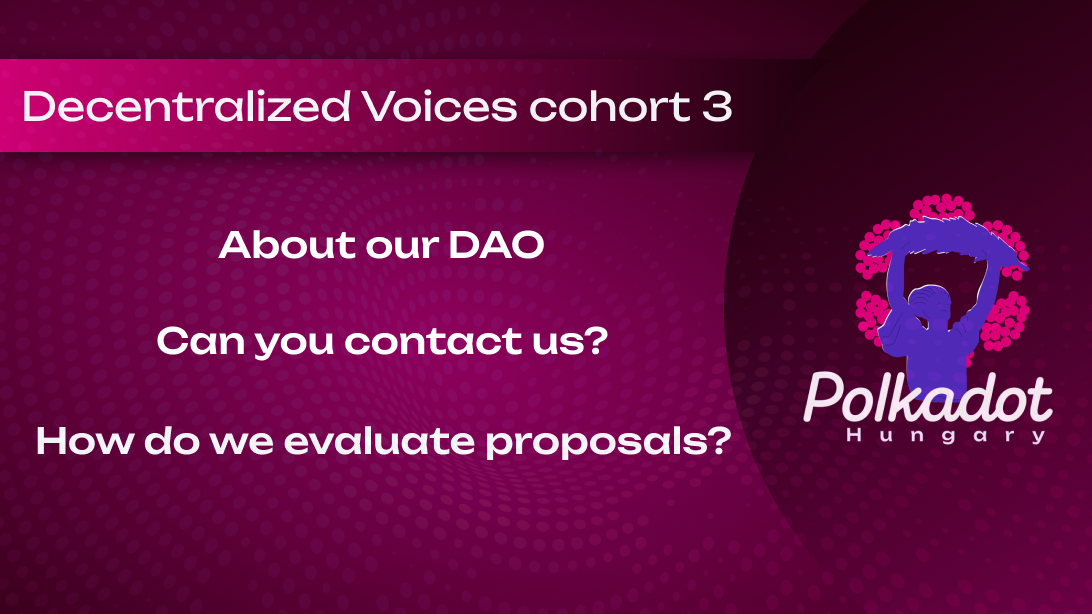A blogpost on our DAO’s proposal evaluation process, voting mechanism and core principles
The Polkadot Hungary DAO is pleased to announce its selection for the third cohort of the Decentralized Voices program, launched by the Web3 Foundation. This opportunity allows Polkadot Hungary DAO, along with five other selected candidates, to help shape on-chain governance on Polkadot and Kusama over the next four months. Our DAO has been entrusted with millions of DOT in voting power and we will use to evaluate community-submitted referendum proposals to the best of our ability using the advice and guidance of our advisory circle.
In the spirit of full transparency, this blog post offers the Polkadot community an inside look at our DAO, our guiding principles, and our approach to evaluating OpenGov proposals.
Polkadot Hungary Community in numbers
To date, Polkadot Hungary DAO has significantly contributed to the growth of the Polkadot ecosystem. Our efforts include publishing over 50 articles, translated from Polkadotters blog posts (big applause to them), hosting nearly 40 Polkadot meetups, workshops, and online gatherings, organizing two hackathons, and holding a major event - Polkadot Day - which became the most attended in-person event of Budapest Blockchain Community Week. We’ve also produced several videos on Polkadot and its ecosystem, available on our YouTube channel.
Since launching the Polkadot Hungary Telegram group, our community has grown to over 200 members, with active daily conversations. Our X (formerly Twitter) and Facebook accounts each have around 200 followers, and our social media presence continues to expand.
We’re especially proud of the fact that, according to Meetup.com’s list of global Polkadot meetups, only six cities - New York, Istanbul, San Francisco, Buenos Aires, Zurich, and Lima - have higher attendance than the Polkadot meetups in Budapest. This highlights the strong relevance and success of our community in Hungary. We believe that small communities, such as Polkadot Hungary, are essential to the growth of the Polkadot ecosystem. These localized groups play a crucial role in expanding outreach globally through Polkadot Meetups, content creation, and local initiatives. By engaging retail investors, developers, and other stakeholders at a grassroots level, these communities help build a vibrant and diverse ecosystem.

How do we evaluate proposals?
When we applied for DV Cohort 3, we committed to being as transparent as possible with the Polkadot community. Over the past months, we’ve developed and tested our internal process for evaluating referenda. Every OpenGov proposal from Kusama and Polkadot is automatically added to the Polkadot Hungary DAO Notion page and undergoes our evaluation process over approximately two weeks, following the steps outlined on our voting page here.
Important notes:
All the rules and voting processes of the Polkadot Hungary DAO can change over time to adapt to the fast-paced evolution of Polkadot and its ecosystem.
We will NOT open public communication channels (such as a Telegram group) to discuss proposals during the voting process. Our voting rationale will be shared (if applicable) in the discussion section of each proposal after we have voted. Additionally, we will not discuss proposals before they are officially submitted.
As with any system, ours is not without limitations. Given the time required for careful decision-making, it’s possible that some proposals will have already been voted on or rejected by the Polkadot community before the Polkadot Hungary DAO completes its evaluation. We’ve accepted this as a potential outcome, which is why our policy states that Polkadot Hungary DAO does not vote on every OpenGov proposal.
Our process:
- Referenda enter the database through Polkassembly API as soon as the are submitted and may be evaluated shortly after they enter the decision phase on OpenGov. Any member of the DAO can evaluate a referendum and make a suggestion for a vote. The internal workflow indicated by the Internal Status property will function as follows:
- Not started Referendum has not been evaluated.
- Considering DAO member designates themselves as the Responsible Person and initiates the evaluation.
- Ready for approval The evaluation is complete, and the referendum is prepared for presentation at the weekly meeting.
- Waiting for agreement The referendum has been discussed at the weekly meeting and awaits 168 hours for additional DAO member evaluations to either: 1. Agree DAO members place themselves in the Agree column to support the evaluator’s recommendation, either by performing their own evaluation or by endorsing the initial evaluator’s conclusion, thereby delegating their vote. 2. To be discussed By placing themselves in the To be discussed coloumn DAO members indicate that they do not agree with the evaluators’s suggestion but are open for discussion to change their minds when presented with more facts, context or a different perspective from other DAO members during the weekly discussions. 3. No way By placing themselves in the No way column DAO members signal firm opposition to the evaluator’s suggestion without room for further discussion. They must provide a justification, which other DAO members must accept. To ensure quorum, an Abstain vote will be cast.
- Ready to vote Once consensus is achieved or a No way indication is accepted, the referendum is ready for voting, and any DAO member can initiate the transaction.
- Reconsidering A vote is cast but the a team member would like the DAO to reconsider as new information is presented.
- Voted Aye An on-chain Aye vote is cast and executed. The execution date is recorded in the Vote Executed property.
- Voted Nay An on-chain Nay vote is cast and executed. The execution date is recorded in the Vote Executed property.
- Voted Abstain An on-chain Abstain vote is cast and executed. The execution date is recorded in the VVote Executed property.
- Not Voted The voting period is ended for the referendum and the DAO has not cast an onchain vote.
- On chain votes are cast (or initiated) during the weekly meeting and in case of a low turnout for signing, other DAO members have 24 hours to sign and execute the transaction.
- Referenda are evaluated based on specific criteria below with an average score between 1-5 (where applicable). Referenda scoring below 3 may receive a Nay vote, while those with a score of 3 or above may receive an Aye vote. Please note that any referendum scoring 1 in Section I: Necessity of the Proposal will automatically receive a Nay vote.
- The Polkadot Hungary DAO may change their vote ONCE if new, relevant information arises during the voting period. After careful consideration of the new information members may propose a vote change; if all members agree, the on-chain transaction will be updated.
- The Polkadot Hungary DAO will comment as follows:
- Aye → Generally no comment, unless the referendum presents an exemplary idea or presentation.
- Nay → Comments suggest improvements if the proposal is viable but requires further development.
- Abstain → Comments address conflicts of interest, internal DAO disputes, or lack of consensus among members. It is also used to increase voting turnout for proposals outside the DAO’s scope.
- The Polkadot Hungary DAO will not vote on all proposals.
How transparent is Polkadot Hungary DAO?
When we applied for DV Cohort 3, we decided to be as transparent as possible with the Polkadot Community. Over the past few weeks, we created and tested our internal referendum evaluation process. Every OpenGov proposal both from Kusama and Polkadot is automatically drops to the Polkadot Hungary DAO Notion page within minutes after being created. The proposals goes through our internal evaluation process over approximately two weeks, following the steps outlined above.
Like any system, this one isn’t perfect. Since the decision-making process is slow and requires careful consideration, it can easily happen that the Polkadot community has already voted on or rejected one or more referendums before Polkadot Hungary DAO even begins evaluating them. We have accepted the possibility of such situations occurring, which is why it is stated in our policy that Polkadot Hungary DAO does not vote on every OpenGov proposal.
Anyone can look into our evaluation process on the Polkadot Hungary DAO Notion page

